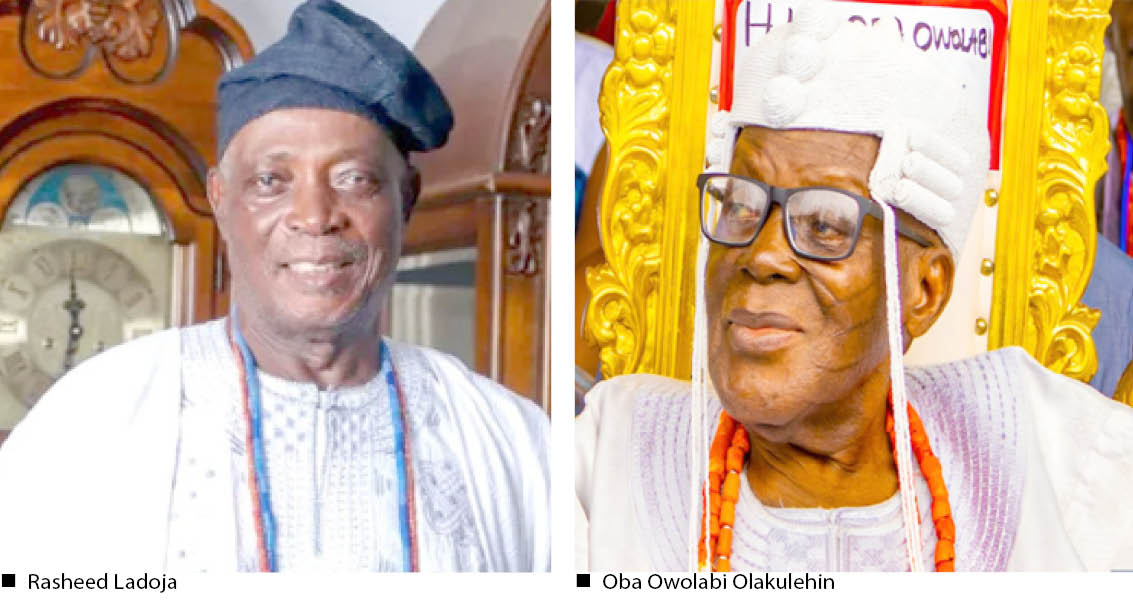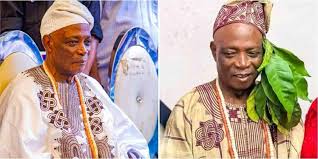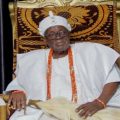Leadership
Rashidi Ladoja poised to become next Olubadan following monarch’s death at 90
Published
7 months agoon

The 43rd Olubadan of Ibadan, Oba Owolabi Olakulehin, has passed away at the age of 90.
He died in the early hours of Monday, barely a year after his coronation. The late monarch had just marked his 90th birthday on July 5.
Born on July 5, 1935, in Okugbaja village, Ita Baale near Akanran—now part of Ibadan North East Local Government Area, Oyo State—Oba Olakulehin advanced through Ibadan’s traditional and respected rotational succession system, which alternates leadership between the civil (Otun) and military (Balogun) lines.
Oba Olakulehin succeeded the 42nd Olubadan, Oba Moshood Olalekan Balogun Alli Okumade II, who reigned for two years.
Renowned as a scholar, the late monarch held a master’s degree in administration and economics and had pursued a PhD. His academic journey reflected a deep commitment to research, integrity, and transparency in public service. He also served as a lecturer at Ahmadu Bello University in Zaria.
On Monday, his family visited Governor Seyi Makinde to officially inform him of the monarch’s passing. The delegation included Bayo Oyero, former President-General of the Central Council of Ibadan Indigenes and Aare Mayegun of Ibadanland; the late king’s younger brother, Osuolale Olakulehin; and his son, Olasumbo Owolabi.

In a statement issued by his Special Adviser on Media, Sulaimon Olanrewaju, Governor Seyi Makinde extended his heartfelt condolences and assured the late monarch’s family of the state government’s full support, including preparations for a dignified burial.
Governor Makinde said, “We never truly want to say goodbye to our elders; we always hope to have them with us longer. But our time on earth is limited by divine design.
“I offer my condolences to the family and to all of us mourning this loss. The government will stand firmly with the family and fulfill its responsibilities, including ensuring Kabiyesi receives a befitting farewell.
“To the family, I urge you to be strong. Coincidentally, today also marks 13 years since I lost my own father. I pray for comfort and strength for you all.”
Earlier in March, false reports about the monarch’s passing had made the rounds but were quickly refuted by both the palace and the state government.
The late Olubadan was a native of the Okugbaja family in Ita Baale, Ibadan. Belonging to the Balogun succession line, he spent 38 years in the chieftaincy hierarchy after becoming Jagun Balogun before eventually ascending the throne.
The Olubadan Succession Structure
Distinct from the chieftaincy systems in other parts of Yorubaland, the Olubadan succession follows a unique rotational structure between two main lines: the civil and the military.
These are known as the Otun (civil) line and the Balogun (military) line.
The Balogun line, traditionally associated with warriors, progresses through six hierarchical titles, starting from Ekarun Balogun (sixth in rank), Ekerin Balogun (fifth), Ashipa Balogun (fourth), Osi Balogun (third), Otun Balogun (second), and culminating in Balogun, the highest position within that line.
On the civil side, the Otun line includes the following ranks: Ekarun Olubadan, Ekerin Olubadan, Ashipa Olubadan, Osi Olubadan, and finally, Otun Olubadan, the most senior title before becoming Olubadan.
The late Oba Owolabi Olakulehin ascended through the Balogun (military) line. Following his demise, the royal succession will now rotate to the Otun (civil) line for the next Olubadan.
Rasheed Ladoja Poised to Become 44th Olubadan
Former Oyo State Governor, Rasheed Ladoja, is next in line for the prestigious Olubadan throne, currently holding the position of Otun Olubadan—the highest-ranking title in the civil chieftaincy line.
Ladoja has long expressed a desire to ascend the Olubadan throne, a dream he openly shared as recently as a year ago.
In August 2024, he accepted the symbolic beaded crown while serving as Otun Olubadan, fulfilling a key requirement under the revised chieftaincy law that mandates only beaded-crown Obas, not just senior chiefs, are eligible for the throne.
The amended declaration, which stirred some controversy and was perceived by some as politically driven, initially met resistance from Ladoja, who had hesitated to accept the crown—unlike several of his contemporaries.
Ladoja Awaits Coronation as 44th Olubadan
After accepting the ceremonial beaded crown, Rasheed Ladoja expressed confidence in his path to the throne. Speaking on Fresh FM, he said, “By the grace of God, I will become Olubadan. God has been kind to me—my blood pressure remains steady.”
He added, “Anyone destined by God to be Olubadan will become Olubadan. No matter the roadblocks, if it is God’s will, it will happen.”
With the passing of Oba Owolabi Olakulehin, Ladoja is widely expected to become the 44th Olubadan of Ibadan.
The process of ascending the throne includes endorsement by the Olubadan-in-Council, formal approval from the Oyo State Government, and an official coronation ceremony.
Born on September 25, 1944, in Gambari village near Ibadan, Ladoja attended Ibadan Boys High School and Olivet Baptist High School before obtaining a degree in chemical engineering from the University of Liège in Belgium.
He began his career with Total before moving into business and eventually politics. He was elected Governor of Oyo State under the PDP banner in April 2003 and assumed office on May 29 of that year.
Ladoja’s Political Journey and Path to the Throne
Rasheed Ladoja’s rise to power as governor was initially backed by the influential PDP chieftain, the late Alhaji Lamidi Adedibu. However, their alliance eventually unraveled due to disagreements over political appointments, which strained governance in the state.
On January 12, 2006, Ladoja was impeached by the Oyo State House of Assembly, paving the way for his deputy, Christopher Adebayo Alao-Akala, to assume office. However, the impeachment was overturned by the Court of Appeal on November 1, 2006, and the ruling was later upheld by the Supreme Court on November 11. Ladoja officially returned to office on December 12 of that year.
Following his tenure, he ran for governor again in 2011 and 2015 under the Accord Party but was defeated both times by Senator Abiola Ajimobi. After brief affiliations with the African Democratic Congress (ADC) and the Zenith Labour Party (ZLP), Ladoja eventually stepped away from partisan politics to focus on his traditional responsibilities in Ibadan.
Celebration as Drummers Signal Transition
Not long after the death of Oba Owolabi Olakulehin, signs of transition emerged at Ladoja’s Bodija residence, where royal drummers arrived—an age-old custom signaling that he is next in line for the Olubadan throne. The atmosphere was filled with jubilation, as the city anticipates the crowning of its 44th monarch.
Ladoja Expected to Return as Tributes Pour In for Late Olubadan
Former Oyo State Governor and Otun Olubadan, Rasheed Ladoja, is expected to return to Nigeria soon to begin the process of ascending the Olubadan throne, following the death of Oba Owolabi Olakulehin. His elevation requires formal approval from Governor Seyi Makinde.
As dignitaries and mourners gathered at the late monarch’s palace, supporters and Ibadan chiefs visited Ladoja’s Bodija residence to offer their congratulations in absentia. His son, Isiaka Ladoja, noted that the former governor had been on the Olubadan line for four decades and had patiently waited his turn.
“Now, it is his turn. Ibadan is waiting for him. As a former governor and senator, he is a man of the people,” he said.
National Leaders Mourn Oba Olakulehin
President Bola Ahmed Tinubu led tributes, describing the late Olubadan as a “highly accomplished man of peace” and a symbol of wisdom and continuity. He revealed that he had recently received an invitation to the monarch’s 90th birthday and first coronation anniversary, which was to be held days after his passing.
Governor Dapo Abiodun of Ogun State, speaking on behalf of Southern governors, described the late king as urbane and deeply versed in Yoruba culture. He praised his brief but impactful reign, which he said fostered peace and unity in Ibadan.
Other traditional leaders, including the Alaafin of Oyo, Oba Akeem Owoade, and the Sultan of Sokoto, Muhammad Sa’ad Abubakar, also paid glowing tributes. They hailed Oba Olakulehin as a monarch of vision, dignity, and quiet influence, whose short reign left a lasting mark on Ibadan and beyond.
Oba Murtala Sani Adeleke, leader of Yoruba traditional rulers in 19 northern states, described the late king as a wise and graceful servant of the people whose passing is a great loss to the Yoruba nation.
You Might Also Like These
 Viktor Gyökeres Breaks Silence After £55m Arsenal Move as Gunners Eye Third Summer Signing
Viktor Gyökeres Breaks Silence After £55m Arsenal Move as Gunners Eye Third Summer Signing
 Olubadan Of Ibadan dies at 90
Olubadan Of Ibadan dies at 90
 Wizkid’s first son, Boluwatife reveals the things he wants for his 9th birthday
Wizkid’s first son, Boluwatife reveals the things he wants for his 9th birthday
 President Buhari receives post lockdown report from COVID-19 task force team (photos)
President Buhari receives post lockdown report from COVID-19 task force team (photos)
 Why I Snubbed PDP Offer, By Edo Widow
Why I Snubbed PDP Offer, By Edo Widow
 Ondo Explosion: Fani-Kayode Reacts
Ondo Explosion: Fani-Kayode Reacts
 Enugu APC blasts Foreign Affairs Minister, Onyeama over arrest of party chieftain
Enugu APC blasts Foreign Affairs Minister, Onyeama over arrest of party chieftain
 Reps To Probe Oduah’s N255m Cars
Reps To Probe Oduah’s N255m Cars
 Governor Of Edo State Adam Oshiomhole Apologises to The Insulted Widow, Gives Her 2M And Offers Employment
Governor Of Edo State Adam Oshiomhole Apologises to The Insulted Widow, Gives Her 2M And Offers Employment
 Coronavirus: NCC explains 5G, answers 19 questions by Nigerians
Coronavirus: NCC explains 5G, answers 19 questions by Nigerians
 Ogun Resident doctors set to embark on strike amid coronavirus pandemic
Ogun Resident doctors set to embark on strike amid coronavirus pandemic
 Every hardworking HUSBAND material in Nigeria is a “40 seconds man”-Nollywood Actor To Tonto Dikeh
Every hardworking HUSBAND material in Nigeria is a “40 seconds man”-Nollywood Actor To Tonto Dikeh
